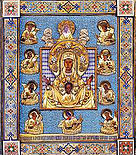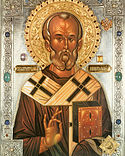BISHOP ANDRONIK’S PASCHAL EPISTLE
Beloved in the Lord pastors, monastics, and laity!
Dear brothers and sisters!
CHRIST IS RISEN!
“Our God is the God of salvation,
and the pathways leading forth from death are those of the Lord’s Lord”
(Psalm 67:21)
At every Divine Liturgy, the priest proclaims these words: “O our God, the God of salvation, teach us to give thanks to You worthily for Your benefits, which You have accomplished and continue to accomplish for us.”
[1]
We often become immersed in the worldly bustle that surrounds us and which, as it seems to us, is the main task of our life. This vanity clouds our minds, and we cease to be grateful to God for His great mercies toward us—both temporal and eternal. “Gratitude from the one who receives encourages the Giver to bestow gifts even greater than the first,” says St. Isaac the Syrian. Gratitude in a Christian is such a great thing that, along with love, it will follow him into the life to come, where he will celebrate the eternal Pascha. If we learn here to thank the Lord for all His mercies, then in eternity we will rejoice with God’s joy and will reign in the Kingdom of God.
The Lord cares for our salvation every minute, regardless of our attitude toward Him—and most often, He does so without our even knowing it. Many holy fathers, in the midst of severe hardship and suffering, frequently asked God to take away their temptations. Yet God did not look to their requests, instead, He looked to what was beneficial for them. And to show this, He said: “…My grace is sufficient for thee, for My strength is made perfect in weakness.” (2 Corinthians 12:9b)
But gratitude has become a rare virtue among people in our present time—the age of the internet, where words and emotions are replaced by emojis.
We must not only know but also truly understand that when we lose something, it is the Lord who takes back what is His. Why do we assume that if God once gave us something, it no longer belongs to Him? He gave us children, gave us health, and ultimately gave us life itself. He is to be blessed both in His giving and in His taking away. When something lent to us temporarily is taken back, we return it without sorrow. But when the Lord takes back what He gave, we often grumble as if it were some injustice of this world. Therefore, we must always remember: the Lord does not deprive us—He simply reclaims what is His.
We must also recognize that there is such a thing as false gratitude to God. This happens when, having received generous spiritual and material gifts from Him—often undeserved—we thank Him with our lips, yet use these gifts solely for our own benefit and consider them our personal possession. Each day, we receive the gift of life anew, but we assume we woke up simply because the alarm clock went off. We’ve become so accustomed to this routine that we no longer see it as a gift from God, nor do we feel the need to thank Him for it.
Undoubtedly, the greatest remedy for this sin is a supreme blessing—prayer and communion with God. Not just formal prayer, recited out of habit or on special occasions, but prayer that comes from the heart. Not confined to set times or measured in hours, but offered unceasingly—day and night. It is the kind of prayer that flows from a heart filled with gratitude. Only then does it become true communication and union with God. Just as the physical eyes are illuminated by light when they see it, so too is the soul illuminated by God’s light when it turns toward Him.
So now, in these Paschal days, my dear brothers and sisters, let us be truly grateful—for His sufferings on our behalf—and for His Resurrection. He has given us the opportunity to enter with Him into the Kingdom of Heaven: Come, ye blessed of My Father, inherit the Kingdom prepared for you from the foundation of the world.” (Matthew 25:34), “But as many as received Him, to them gave He power to become the sons of God, even to them that believe on His name.” (John 1:12).
Even before mankind came into being, the Kingdom of Heaven was already prepared for the righteous—for God knows the future. But we must, with all the strength of our soul, strive toward Him so that, in the words of the Psalmist, we do not lose this gift: “…and he delighted not in blessing, and it shall be far from him” (Psalm 108:16).
To fully experience the joy of Pascha, each of us must rise with our soul, turn away from sin. As we know from Holy Scripture, the Second Coming of Christ will be entirely different from the first. If in His first coming He appeared as a humble Servant, full of meekness and lowliness; then, in the Second, He will come as a King on His throne, accompanied by Angels.
CHRIST IS RISEN!!! TRULY HE’S RISEN!!!
† Andronik, Archbishop of New York and North America
Pascha
April 7/20, 2025

